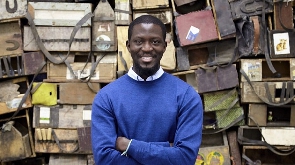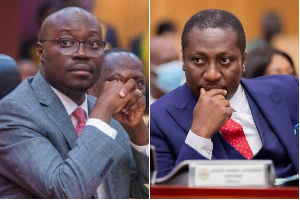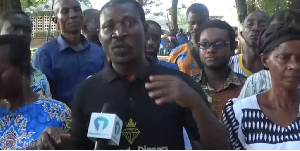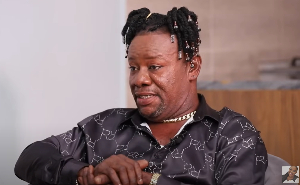Renowned Ghanaian artist, Ibrahim Mahama, has removed and taken possession of Ghana’s treasure trove of old railway engines and coaches, and other historical and archival materials and valued objects, some over a hundred years old, from the Railway Mechanical Workshop in Sekondi, popularly called, LOCATION or LOCO, for short.
On Saturday, January 7, 2023, Ibrahim Mahama claimed that he transported from Sekondi out-of-service railway engines and coaches – national assets which have never been on sale – to his art centers, Savannah Centre for Contemporary Art (SCCA) and the Red Clay Studios in Tamale, a journey of over 600km (400 miles).
His reason: Mahama argues that most of his ethnic Tamale people have never seen a train in their lives.
But the clear evidence is that the railway system of the colonial era to date covered only mainly mining towns, making Mahama’s emotional appeal untenable.
In any case, how should the children born in that great former industrial city of Sekond-Takoradi also be educated about their history without the material he claims to have bought from a “scrap” dealer?
The alleged purchase of the items from a supposed scrap dealer is not credible.
LOCATION was a once thriving center of mechanical engineering and trade unionism in Ghana.
Events at the site were significant in Ghana’s fight against colonialism, and later, also, in the fight for economic independence.
It was the first and largest mechanical workshop in sub-Saharan Africa and it was manned largely by proud, innovative and well-trained Africans.
There is a very good case for it to be declared a World Heritage site under UNESCO for the following reasons:
First, the Ghana Railway Workshop at Sekondi, aka LOCATION, and its artifacts constitute a unique common heritage, for the people of Sekondi, the Western Region and Ghana.
Second, it was a place of great union activity and militant advocacy – when Sekondi railway workers declared a strike, Ghana’s manufacturing came to a standstill.
Third, my late father, Anthony K. Wemega-Kwawu, who retired in 1971 as the Works Manager of Ghana Railway Corporation (GRC), now, Ghana Railways Company (GRC), was among the first indigenes sent by the colonialists to colleges in Birmingham, Manchester and Liverpool as part of succession planning.
Through such training, the GRC used those expert engineers, coming from all parts of the country, to design and build coaches right here in Ghana.
In fact, there was no mechanical work that was beyond them, it was a hotbed of indigenous science, innovation and research.
Could anybody pick any of the cannon balls from the Slave Castles of Elmina and Cape Coast and send them elsewhere with the excuse that the children at this new place needed to see them to familiarize themselves with the Slave Trade?
The children of Tamale can meanwhile be taught through the use of audio-visual aids, the physical objects need not be moved for learning to be effective. There is a Rail Development Master Plan in the offing being steadily executed by the Ghana Railways Development Authority (GRDA) to extend rail service to many parts of the country, including Tamale, and even beyond to other West African countries.
We pray and hope the process is expedited and the rail service gets to Tamale in good time.
Let us remember that Tamale is not the only community that historically has had no railway experience.
Ibrahim Mahama’s confessions on a Citi TV documentary broadcast on January 15, 2023, show that he obtained through shenanigans Colonial Maps, Files, Photographs, Books, Mechanical & Technical Drawings – and other valued historic treasures – cabinets, drawers, train seats, clocks, lamps, etc., from the archives of the Ghana Railway offices at LOCATION in Sekondi.
Simply put, one can infer from the documentary that he almost certainly compromised by inducement the security guards at LOCATION and they facilitated his removal of the items.
Ibrahim Mahama has, hitherto, exhibited some of these materials in a number of major international art exhibitions as his intellectual property, a false and unethical claim beyond the bounds of professional common decency.
Just as the global campaign by all people of goodwill and art lovers/ critics was mounted to return looted African treasures taken to the West, Mahama must be compelled to return the Sekondi-Takoradi railway artifacts at once.
Currently, the Twin-City of Sekondi-Takoradi boasts of a number of technical and engineering schools – the Mechanical and Electrical Engineering Departments of the Takoradi Technical University (TTU); the Takoradi Technical Institute (TTI); The Intermediate Technology Transfer Unit (ITTU), and the newly established University of Railways at Essikadu, Sekondi.
Needless to say, these institutions would be able to benefit immensely from the historical heritage of the Mechanical Workshop at LOCATION, unless of course the recent immoral cultural pillage and vandalism is allowed to stand.
In its prime, LOCATION was forging machine parts for all the manufacturing industries in the Twin-City enclave and elsewhere in the region, and in the country/ Some of the manpower is still available to train our tertiary engineering students when mentorship/coaching sessions are organized with LOCATION as a training facility, hence the urgent need to return the stolen items.
If Mahama was given a free hand by less than-scrupulous public officials, then this must be unearthed by a thorough investigation followed by severe consequences.
All items in the Ghana Railway Workshop belong to the State of Ghana. If people were taking items arbitrarily out of LOCO, he, Ibrahim Mahama, would not have come to meet them. All these historical items belong to the Twin City and have to remain here, no matter what.
We cannot sit down unconcerned for a stranger to come into the city and just plunder the Railway Workshop of historical objects which belong to us. Future generations of the people of the
Western Region would not forgive us if we allow Ibrahim’s unethical practice as art to prevail.
The headquarters of the Ghana Railways was/is in Sekondi-Takoradi and it should remain so. LOCO could also be turned into a living museum for the benefit of the people of the Western Region, especially, the children, who have to be exposed to the rail and political history of the country. We cannot deny them what rightfully belongs to them, for the pleasure and edification of other children elsewhere.
We should collectively and vehemently demand that Ibrahim Mahama return immediately all the goods he has pillaged over time from the Ghana Railways Workshop in Secondi and its auxiliary sub-stations, whether he acquired them lawfully or not. These items belong to the State and are not supposed to be in an individual holding.
RIKKI WEMEGA-KWAWU
Rikki Wemega-Kwawu is an internationally renowned Ghanaian contemporary artist and writer, born in Sekondi in 1959. He is a keen observer and critical commentator of the Ghanaian art, political and social scenes. He lives and works in Takoradi. Rikki is the son of Mr. Anthony K. Wemega-Kwawu, who was a former Works Manager and a stalwart of the Ghana Railways in is hey days. Rikki describes himself as born into the Ghana Railways, having witnessed live and
firsthand its glorious days and its steady decline. He is so passionate about matters to do with the Ghana Railways.
P.S.: For a fuller, more comprehensive text, please click on the link below:
Opinions of Sunday, 5 February 2023
Columnist: Rikki Wemega-Kwawu



















